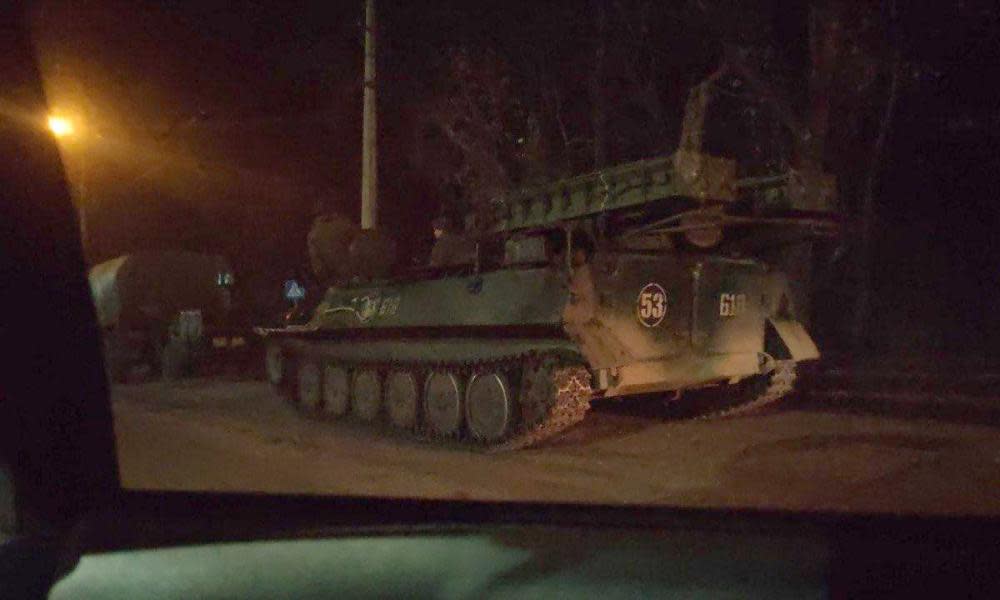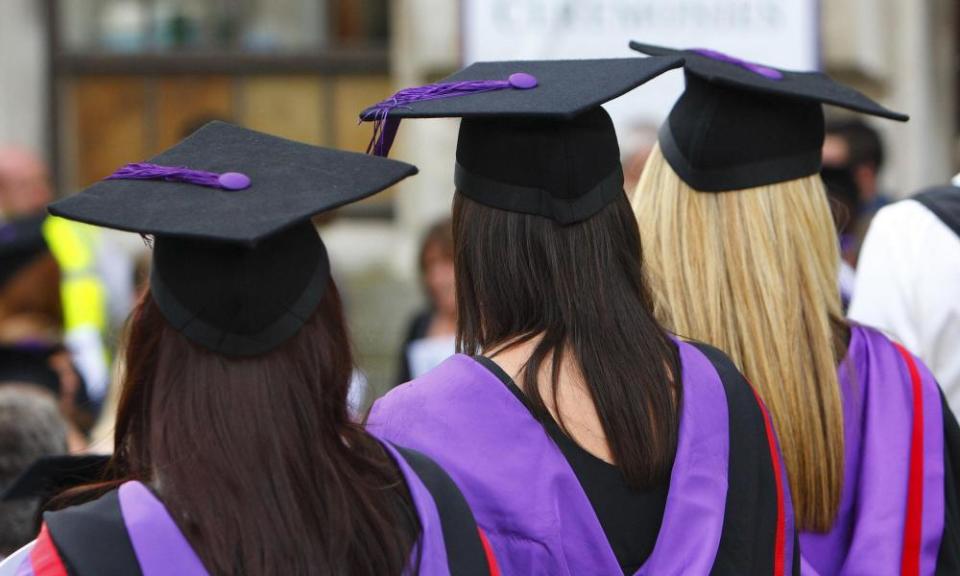Thursday briefing: Russia invades Ukraine

Top story: Kremlin invokes ‘demilitarisation’ as excuse
Hello – Warren Murray introducing the news on a day we feared would come.
Russian forces have attacked Ukraine on the orders of Vladimir Putin, who announced what he called a “special military operation” at dawn. Explosions and airstrikes have been heard this morning near major Ukrainian cities, including the capital, Kyiv, and air raid sirens went off. Our correspondent Luke Harding reported earlier: “At least seven ‘powerful’ airstrikes on Vasilkovsky airport outside Kyiv, where Ukraine’s military fighter bombers are kept, Kyiv command says.” The Ukraine foreign minister, Dmytro Kuleba, confirmed what he called the “full-scale invasion of Ukraine. Peaceful Ukrainian cities are under strikes.”
In a bid to justify the invasion, Putin branded Ukraine an “anti-Russia … created on our historic lands” and claimed the campaign was for the “demilitarisation and denazification” of Russia’s neighbour – echoing a false theme of Kremlin propaganda that the Kyiv government is controlled by the far right. Joe Biden said: “The prayers of the entire world are with the people of Ukraine tonight as they suffer an unprovoked and unjustified attack by Russian military forces. President Putin has chosen a premeditated war that will bring a catastrophic loss of life and human suffering.” Boris Johnson said: “I am appalled by the horrific events in Ukraine and I have spoken to President Zelenskiy to discuss next steps. President Putin has chosen a path of bloodshed and destruction by launching this unprovoked attack on Ukraine. The UK and our allies will respond decisively.” Here’s what we know so far about the Russian invasion. Make sure you keep up with the rapid developments in Ukraine at our live blog.
As Putin was speaking and the first detonations were reported, the UN security council was holding an emergency session, chaired by Russia itself, which holds the rotating presidency, and at which the Russian and Ukrainian representatives traded barbs. Ukraine’s president, Volodymyr Zelenskiy, earlier put out an address appealing directly to the Russian people to “listen to the voice of reason”. Russia’s leadership, he said, was “telling you that this flame will liberate the people of Ukraine, but the Ukrainian people are free”. He warned: “If someone attempts to take away our land, our freedom, our lives, the lives of our children, we will defend ourselves. By attacking, you will see our faces, not our backs, but our faces.”
With international condemnation growing, Russia’s defence minister, Sergei Shoigu, the commanders-in-chief of the Russian air force and Black Sea fleet, leading state “propagandists” and 351 Duma deputies are expected to be identified in EU sanctions that go further than the US, and further still than Boris Johnson’s Russia sanctions. Larry Elliott thinks that targeting Putin’s regime economically has mixed prospects: “Putin has been actively seeking to insulate Russia from the west ever since the invasion of the Crimea in 2014 … [and] Russia has used the money from its oil and gas exports to build up substantial financial defences. Moscow is sitting on foreign currency reserves of about $500bn (£369bn) and, by international standards, has extremely low levels of national debt.” The latter has a bearing on sanctions that stop Russia issuing or trading its sovereign debt in London and New York: the amount of bonds Russia needs to sell is relatively small.
Europe’s dependence on gas from Russia looms large in all of this, of course. According to calculations by the Institute of Energy Economics at the University of Cologne shared with the Guardian, current levels of gas held in European reserves “could compensate for a loss of Russian deliveries” over the next six weeks unless temperatures were to drop dramatically in February or March. The US and other countries have said they are ready to step in with supplies of gas if Russia cuts Europe off.
* * *
Another 10 years of debt – Students in England will have to continue paying back university loans over 40 years instead of 30. The number of graduates repaying in full is expected to double from under a quarter to more than half. They will face repayments sooner as the government cuts the wage threshold from £27,295 to £25,000 for new borrowers from September 2023. Martin Lewis, the founder of MoneySavingExpert.com, said: “It’s effectively a lifelong graduate tax for most.” Larissa Kennedy, president of the UK National Union of Students, said ministers were “saddling young people with unimaginable debt for the next 40 years of their lives”.

In a concession, interest rates on student loans will be slashed for new borrowers and set no higher than the rate of inflation from next year – but Labour’s shadow education secretary accused the government of delivering a stealth tax that hits those on low incomes hardest. The government is also launching consultations on introducing minimum eligibility requirements to access student loans; and a lifelong loan entitlement for the equivalent of four years of post-18 education.
* * *
Meat and cancer – Vegetarians have a 14% lower chance of developing cancer than meat eaters, according to a large study by Oxford researchers. Compared with people who eat meat more than five times a week, those who consumed small amounts had a 2% lower risk of cancer. The authors made clear that their findings did not conclusively prove regular meat-eating increased the risk of cancer. Smoking and body fat could also help explain the differences found, they said. Low meat eaters in the study had a 9% lower risk of developing bowel cancer than regular meat eaters. Vegetarian women were 18% less likely than those who ate meat regularly to develop postmenopausal breast cancer, though that may be due to their lower body mass index. Vegetarian men had a 31% lower risk of prostate cancer, while among males who still ate fish it was 20% lower.
* * *
Starmer v Sunak – Keir Starmer will today pledge to “reimagine the role of government” as a partner to the private sector and take advantage of the opportunities of Brexit. Speaking in Huddersfield, the Labour leader will promise to value private companies as a partner to the state, and lay into Rishi Sunak and the Conservatives for “increasing taxes more than any other chancellor in half a century”. Labour’s strategy is for Starmer to drill issues such as tax and the cost of living to inflame Tory divisions and put Sunak in the spotlight given his ambitions to succeed Johnson as leader. Sunak will be delivering the annual Mais lecture at Bayes business school, in which he will say he wants to cut taxes “sustainably” and downgrade the role of the state as an engine of growth – aiming to quell concern among Tory backbenchers about the tax burden rising to its highest level in 70 years.
* * *
Ikea but it’s Lidl – Today, Ikea’s £170m experiment on the former Kings Mall in Hammersmith will be tested with the opening of Livat, its first city centre shopping mall globally and the first to be refurbished rather than built from scratch.
Ikea has 47 other shopping centres worldwide, but Livat is just over a third of the size of its typical site, and its first in the UK. It houses Ikea’s only high street store in the UK, a quarter the size of a typical store, as well as a Lidl, a Library of Things, and Sook, a rent-by-the hour retail or events space.
Today in Focus podcast: Covid gets free rein
Today marks the first day in nearly two years that no laws will be in place in England to deal with the spread of Covid-19. But is the government still following the science?
Lunchtime read: One person’s influence is someone else’s profit
More and more young people are enticed by the glittering promises of a career as an influencer – but it’s usually someone else getting rich.
Sport
Ralf Rangnick admitted Manchester United’s plan was in the “dustbin” after Atlético Madrid scored on seven minutes before Anthony Elanga’s second half equaliser snatched a draw for the interim manager’s team in the Champions League last-16 first leg. Antonio Conte has questioned whether he is the right manager to turn Tottenham’s fortunes around after Burnley inflicted their fourth defeat in five games. England manager Sarina Wiegman said her side have taken “lots of information” from their 3-1 victory against Germany and inaugural Arnold Clark Cup win but will not get carried away before the European Championship in the summer.
In the Premier League, Liverpool hammered Leeds 6-0 at Anfield, with two goals each for Mohamed Salah and Sadio Mané and one apiece for Joël Matip and Virgil van Dijk. England coach Eddie Jones is expected to deploy Manu Tuilagi at centre for the Six Nations encounter with Wales, who have dropped Louis Rees-Zammit. After four Olympic Games, seven gold and two silver medals, Sir Jason Kenny, Britain’s most decorated Olympian, has announced his retirement. Joe Root has declined to divulge his role in the decision to drop Jimmy Anderson and Stuart Broad for the West Indies tour but said it does not shut the door on their record-breaking careers. And Lewis Hamilton has accused Formula One stewards of potential bias towards specific drivers and teams as old wounds were reopened on the first day of pre-season testing in Barcelona on Wednesday.
Business
Vladimir Putin’s decision to invade Ukraine has wreaked havoc on already-wobbly financial markets this morning with shares falling precipitously in Asia Pacific overnight. Hong Kong was the worst hit, down more than 3%, and the FTSE100 is set to shed around 2.5% at the opening bell. Brent crude soared past $100 a barrel in a sign of increasing nerves about the impact on supplies, the Russian rouble hit a record low and the Moscow stock exchange suspended trading on all markets. The US dollar strengthened on all the uncertainty and left the pound at $1.349 and €1.201.
The papers
The print editions were slightly overtaken by events today. The Guardian’s splash is “State of emergency in Ukraine as US warns Putin ready to invade”. “Welcome to hell” – the Mirror says that is the “warning from Ukraine” to Russian soldiers if they invade. But the Express says Putin is “Hell-bent” and has “gone full tonto” – the latter having been said by the UK defence secretary, Ben Wallace, and the former by Liz Truss, the foreign secretary. Wallace clearly had the better line: “Putin’s gone ‘full tonto’” is the Metro’s page one headline.
The Financial Times says “Brussels hits Putin’s inner circle as US hardens invasion warning”. The i has a front-page Ukraine picture overlaid with “State of emergency declared as nation feels ‘knot of fear’”. Its splash though is “Students to face ‘lifelong graduate tax’”, the same story that leads the Times: “Students set to shoulder £100k bill for degrees”. “Sunak vows to slash tax burden” says the Telegraph, while at this moment the Mail is most worried about Britain’s spies being told, as it puts in its own words, to “go woke” by an internal guide to diversity and inclusion. The Sun says mock royal jewels from TV show The Crown have been stolen.
Sign up
The Guardian Morning Briefing is delivered to thousands of inboxes bright and early every weekday. If you are not already receiving it by email, you can sign up here.
For more news: www.theguardian.com
Get in Touch
If you have any questions or comments about any of our newsletters please email newsletters@theguardian.com
Sign up to Inside Saturday to get an exclusive behind the scenes look at the top features from our new magazine delivered to your inbox every weekend

 Yahoo News
Yahoo News 
